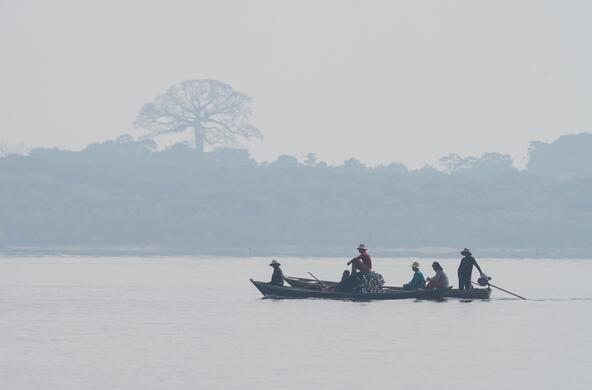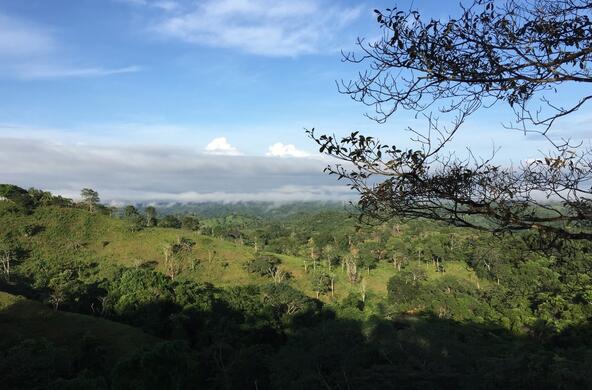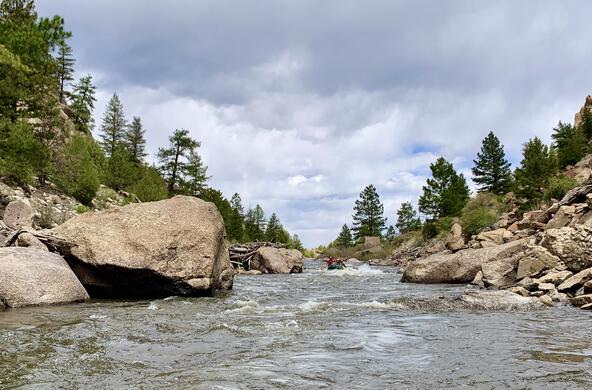Millbrook, NY – Climate change is affecting the spread of infectious diseases worldwide, according to an international team of leading disease ecologists, with serious impacts to human health and biodiversity conservation. Writing in the journal Science, they propose that modeling the way disease systems respond to climate variables could help public health officials and environmental managers predict and mitigate the spread of lethal diseases.
"Biodiversity loss is a well-established consequence of climate change," said coauthor Richard Ostfeld of the Cary Institute of Ecosystem Studies. "In a number of infectious disease systems, such as Lyme disease and West Nile virus, biodiversity loss is tied to greater pathogen transmission and increased human risk. Moving forward, we need models that are sensitive to both direct and indirect effects of climate change on infectious disease."

When it comes to Lyme disease and other tick-borne maladies, climate change is tied to greater pathogen transmission and increased human risk. (Credit: Cary Institute staff)
The issue of climate change and disease has provoked intense debate over the past decade, particularly in the case of diseases that affect humans. "For a lot of human diseases, responses to climate change depend on the wealth of nations, healthcare infrastructure and the ability to take mitigating measures against disease," said lead author Sonia Altizer of the University of Georgia. "The climate signal, in many cases, is hard to tease apart from other factors like vector control and vaccine and drug availability."
"We need to transcend simple arguments about which is more important—climate change or socioeconomics—and ask just how much harder will it be to control diseases as the climate warms?" Ostfeld adds. "Will it be possible at all in developing countries?"
Climate warming already is causing changes in diseases affecting wildlife and agricultural ecosystems, Altizer noted. "In many cases, we're seeing an increase in disease and parasitism. But the impact of climate change on these disease relationships depends on the physiology of the organisms involved, the location on the globe and the structure of ecological communities."
At the organism level, climate change can alter the physiology of both hosts and parasites. Some of the clearest examples are found in the Arctic, where temperatures are rising more rapidly than elsewhere, resulting in faster developing parasites. A lungworm that affects muskoxen, for instance, is now transmitted over a longer period each summer, with crippling impacts.
"The Arctic is like a 'canary in the global coal mine,'" said co-author Susan Kutz of the University of Calgary and Canadian Cooperative Wildlife Health Centre. "Climate warming threatens the health and sustainability of Arctic plants and animals, which are adapted to a harsh and highly seasonal environment and are vulnerable to invasions by 'southern' species—both animals and parasites."
A changing climate also is affecting entire plant and animal communities. Coral reef ecosystems are particularly vulnerable. In places like the Caribbean, warmer water temperatures have stressed corals and facilitated infections by pathogenic fungi and bacteria. When corals—the framework builders of the ecosystem—succumb, the myriad of species that depend on them are also at risk.

Study co-author Drew Harvell in the Palmyra Atoll, Pacific Ocean, photographs a giant plating Acropora coral colony with tumors. Climate warming is associated with the loss of coral symbionts and the proliferation of lethal coral diseases. (Credit: Bette Willis/James Cook University)
Where human health is concerned, there is not only the direct risk from pathogens like dengue, malaria, and cholera, all of which are linked to warmer temperatures, but indirect risks from threats to agricultural systems and game species crucial for subsistence and cultural activities.
"Earth's changing climate and the global spread of infectious diseases are threatening human health, agriculture, and wildlife. Solving these problems requires a comprehensive approach that unites scientists from biology, the geosciences and the social sciences," said Sam Scheiner, program director for the joint National Science Foundation-National Institutes of Health Ecology and Evolution of Infectious Diseases Program.
To respond to that challenge, the paper’s authors—Altizer, Ostfeld, Kutz, Pieter T. J. Johnson of the University of Colorado Boulder and C. Drew Harvell of Cornell University—laid out an agenda for future research and action. One recommendation is to develop early warning systems by expanding data about the physiological responses hosts and parasites have to temperature changes.
"We'd like to be able to predict, for example, that if the climate warms by a certain amount, then in a particular host-parasite system we might see an increase from one to two transmission cycles per year," Altizer said. "But we'd also like to try to tie these predictions to actions that might be taken." Such forecasting is well established in crop disease management and has been used to both preventatively close coral reefs and target areas at risk of malaria outbreaks.
"We face a tough task in the oceans, where disease outbreaks can be out of sight and undetected," Harvell said. "Because some coral disease outbreaks are predictable from warming events, we are developing forecasting programs to help us respond before the outbreak begins."
The researchers also pointed out that certain human communities, such as those of aboriginal peoples in the Arctic, could be disproportionately impacted by climate-disease interactions due to a reliance on at risk wildlife as a source of food, income, and cultural activity.
Johnson concluded, "Given the rising importance of infectious diseases not only for human health but also wildlife conservation, it's also a challenge for which we are in sore need of a solution. We hope our work contributes to that."
The study was funded in part by the National Science Foundation.
Expert Contacts:
Richard Ostfeld, 845-677-7600 x136, ostfeldr@caryinstitute.org
Sonia Altizer, 706-542-9251, saltizer@uga.edu
Susan Kutz, 403-210-3824, skutz@ucalgary.ca
C. Drew Harvell, 607-254-4274, cdh5@cornell.edu
Media Contacts: Lori Quillen, Cary Institute of Ecosystem Studies (845) 677-7600 quillenl@caryinstitute.org, Cheryl Dybas, NSF (703) 292-7734 cdybas@nsf.gov, Beth Gavrilles, University of Georgia (706) 542-7247 bethgav@uga.edu, Jim Scott, University of Colorado Boulder (303) 492-7531 jim.scott@colorado.edu, John Carberry, Cornell University (607) 255-5353 johncarberry@cornell.edu







